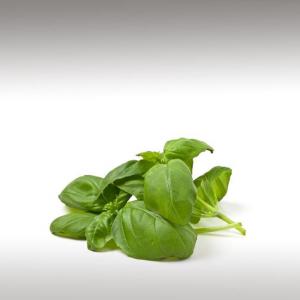
BASIL ESSENTIAL OIL (OCIMUM BASILICUM) - ESSENTIAL OILS

BASE / GENERAL DATA
Information submited: March 25, 2015 By: OperaDreamhouse
Botanical Name: Ocimum basilicum
Common Method of Extraction: Steam distillation
Part Typically Used: Flowering plant (Leaves and Flowers/Buds)
Color: Clear
Consistency: Thin
Perfumery Note: Top
Strength of Initial Aroma: Fresh, warm, spicy, herbaceous
Basil, Thai basil, or Sweet basil, is a common name for the culinary herb Ocimum basilicum of the family Lamiaceae (mints), sometimes known as Saint Joseph's Wort in some English-speaking countries.
Basil is possibly native to India, and has been cultivated there for more than 5,000 years. A much favored herb in India, it is held sacred to Krishna and Vishnu, and the leaves are even chewed before taking part in religious ceremonies.
The word Basil comes from the Greek (basileus), meaning "King", as it has come to be associated with the Feast of the Cross commemorating the finding of the True Cross by St. Helena, mother of the emperor Constantine I. Basil is still considered the "King of herbs" by many cookery authors.
Depending on the species and cultivar, the leaves may taste somewhat like anise, with a strong, pungent, often sweet smell.
Basil grows between 30 - 130 centimeters tall, with opposite, light green, silky leaves 3 - 11 centimeters long. The flowers are small, white in color and arranged in a terminal spike. Basil is very sensitive to cold, with best growth in hot, dry conditions. It behaves as an annual if there is any chance of a frost. Grows best in strong sunlight.
Once a stem produces flowers, foliage production stops on that stem, the stem becomes woody, and essential oil production declines. To prevent this, a Basil-grower may pinch off any flower stems before they are fully mature. Because only the blooming stem is so affected, some stems can be pinched for leaf production, while others are left to bloom for decoration or seeds.
Chemical structure:
The various Basil have such different scents because the herb has a number of different essential oils that come together in different proportions for various breeds. The strong clove scent of Sweet basil is derived from eugenol.
The chemical composition of Basil essential oil can vary greatly between varieties, batches and suppliers. Ideally, look for Basil essential oil that has a a significant percentage of linalooland that is weak in methyl chavicol (Estragole), a suspected carcinogen. Basil oils that are higher in linalool tend to have a more appealing aroma. Additionally, linalool is said to act as an insect repellent.
Common Method of Extraction: Steam distillation
Part Typically Used: Flowering plant (Leaves and Flowers/Buds)
Color: Clear
Consistency: Thin
Perfumery Note: Top
Strength of Initial Aroma: Fresh, warm, spicy, herbaceous
Basil, Thai basil, or Sweet basil, is a common name for the culinary herb Ocimum basilicum of the family Lamiaceae (mints), sometimes known as Saint Joseph's Wort in some English-speaking countries.
Basil is possibly native to India, and has been cultivated there for more than 5,000 years. A much favored herb in India, it is held sacred to Krishna and Vishnu, and the leaves are even chewed before taking part in religious ceremonies.
The word Basil comes from the Greek (basileus), meaning "King", as it has come to be associated with the Feast of the Cross commemorating the finding of the True Cross by St. Helena, mother of the emperor Constantine I. Basil is still considered the "King of herbs" by many cookery authors.
Depending on the species and cultivar, the leaves may taste somewhat like anise, with a strong, pungent, often sweet smell.
Basil grows between 30 - 130 centimeters tall, with opposite, light green, silky leaves 3 - 11 centimeters long. The flowers are small, white in color and arranged in a terminal spike. Basil is very sensitive to cold, with best growth in hot, dry conditions. It behaves as an annual if there is any chance of a frost. Grows best in strong sunlight.
Once a stem produces flowers, foliage production stops on that stem, the stem becomes woody, and essential oil production declines. To prevent this, a Basil-grower may pinch off any flower stems before they are fully mature. Because only the blooming stem is so affected, some stems can be pinched for leaf production, while others are left to bloom for decoration or seeds.
Chemical structure:
The various Basil have such different scents because the herb has a number of different essential oils that come together in different proportions for various breeds. The strong clove scent of Sweet basil is derived from eugenol.
The chemical composition of Basil essential oil can vary greatly between varieties, batches and suppliers. Ideally, look for Basil essential oil that has a a significant percentage of linalooland that is weak in methyl chavicol (Estragole), a suspected carcinogen. Basil oils that are higher in linalool tend to have a more appealing aroma. Additionally, linalool is said to act as an insect repellent.

SPIRITUAL PRACTISES DATA
Information submited: April 6, 2023 By: OperaDreamhouse
Basil essential oil, also known as Ocimum basilicum, is believed to have numerous spiritual and mystical properties. It has been used for centuries in spiritual practices and rituals due to its powerful energy and connection to higher consciousness. Its protective, purifying, clarifying, and consciousness-enhancing properties make it a popular choice for those seeking spiritual guidance and connection.
Protection: Basil essential oil is believed to offer powerful protection against negative energy and unwanted influences. It can create a shield of positive energy around the user, helping to ward off negative thoughts, emotions, and intentions.
Purification: Basil essential oil is thought to have purifying properties that can cleanse negative energy and purify the soul. It can help remove spiritual blockages and promote a sense of inner peace and harmony.
Clarity: Basil essential oil is believed to promote mental clarity, focus, and insight. It can help remove mental fog, confusion, and doubt, allowing the user to tap into their intuition and higher wisdom.
Connection to higher consciousness: Basil essential oil is associated with the crown chakra and is believed to help the user connect to higher consciousness and spiritual realms. It can enhance spiritual practices such as meditation, prayer, and divination, helping the user to tap into their inner wisdom and intuition.
Protection: Basil essential oil is believed to offer powerful protection against negative energy and unwanted influences. It can create a shield of positive energy around the user, helping to ward off negative thoughts, emotions, and intentions.
Purification: Basil essential oil is thought to have purifying properties that can cleanse negative energy and purify the soul. It can help remove spiritual blockages and promote a sense of inner peace and harmony.
Clarity: Basil essential oil is believed to promote mental clarity, focus, and insight. It can help remove mental fog, confusion, and doubt, allowing the user to tap into their intuition and higher wisdom.
Connection to higher consciousness: Basil essential oil is associated with the crown chakra and is believed to help the user connect to higher consciousness and spiritual realms. It can enhance spiritual practices such as meditation, prayer, and divination, helping the user to tap into their inner wisdom and intuition.

MEDICINE / HEALTH DATA

BEAUTY / COSMETICS DATA

FOOD / COOKING DATA
COMMENTS
No comments.


